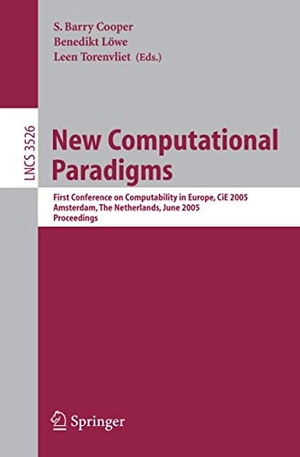Für statistische Zwecke und um bestmögliche Funktionalität zu bieten, speichert diese Website Cookies auf Ihrem Gerät. Das Speichern von Cookies kann in den Browser-Einstellungen deaktiviert werden. Wenn Sie die Website weiter nutzen, stimmen Sie der Verwendung von Cookies zu.
Cookie akzeptieren
New Computational Paradigms
- Springer Berlin Heidelberg
- 2005
- Taschenbuch
- 600 Seiten
- ISBN 9783540261797
CiE 2005: New Computational Paradigms http://www. illc. uva. nl/CiE/ ThecooperationComputabilityinEurope (CiE)isaninformalEuropeannetwork covering computability in theoretical computer science and mathematical logic, ranging from application of novel approaches to computation to set-theoretic analysesofin?nitarycomputingmodels. Thecooperationconsistsofelevenmain nodesandincludesover400researchers;itiscoordinatedfromLeeds(UK). More information about CiE can be found in Barry Cooper¿s introductory paper to this volume (p. 1) and at http://www. amsta. leeds. ac. uk/pure/staff/cooper/cie. html CiE 2005 was a conference on the special topic ¿New Computational Pa- digms¿ and was held in Amsterdam in June 2005. It was initiated by and served as a focus point for the informal cooperation CiE. The topic of ¿New Com- tational Paradigms¿ covers connections between computation and
Mehr
Weniger
zzgl. Versand
in Kürze